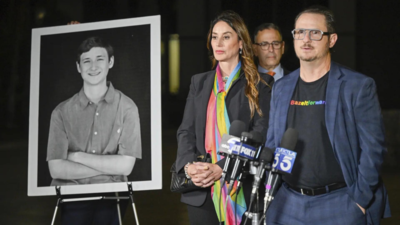In a haunting phone call recorded days after Blaze Bernstein went missing in January 2018, his father Gideon Bernstein reached out to Samuel Woodward, the last person known to have seen his son alive. The exchange, marked by apparent concern from Woodward, later unravelled as a chilling piece of evidence in a case that revealed hate, violence, and deception.
Blaze Bernstein, a 19-year-old pre-med student at the University of Pennsylvania, disappeared while visiting his family in Lake Forest, California, during winter break. On January 3, 2018, Blaze had gone out to meet Woodward, a former high school classmate, after connecting on social media. When Blaze failed to return home, leaving behind his glasses, wallet, and packed bags for his return to college, his family grew alarmed.
In desperation, Blaze’s father used social media to track Woodward and initiated a phone call, which his daughter Beaue recorded. According to ABC News, Gideon told Woodward, “We haven’t heard from him all day. He missed an appointment today, and then we started getting concerned. You’re the first real clue to the puzzle here.”
Woodward responded with apparent empathy, saying, “Yeah, I feel like [expletive], honestly, I’m sorry. I want to find Blaze as much as you do.” He went on to describe their evening, claiming Blaze suggested meeting another friend at Borrego Park. According to Woodward, Blaze walked off into the night, leaving him waiting by a restroom.
The story raised more questions than answers. As Blaze’s family pressed for clarity, their instincts led them to alert authorities, who soon placed Woodward under surveillance.
Grim discovery
Six days after Blaze went missing, his body was found in a shallow grave at Borrego Park. The brutal nature of his death shocked investigators and the community. Blaze had been stabbed multiple times in the face, neck, and knee, with defensive wounds indicating a desperate fight for his life.
Woodward was brought in for questioning and later arrested. As Daily Mail reported, a search of his home uncovered evidence tying him to violent neo-Nazi ideologies, including a bloodstained mask, knife, and anti-gay and anti-Semitic materials.
Hate-driven crime
Prosecutors contended that Woodward’s actions were motivated by hate, presenting evidence of his association with the Atomwaffen Division, a neo-Nazi extremist group. They argued that Woodward targeted Blaze because he was gay and Jewish, a claim Woodward denied.
In court, Woodward’s defence shifted blame to personal struggles, including a diagnosis of autism and confusion about his sexuality. His attorney claimed the killing was a panicked reaction to a perceived invasion of privacy, alleging without evidence that Blaze was attempting to photograph him during an intimate moment.
Woodward was convicted of first-degree murder with a hate crime enhancement in July 2024 and sentenced to life without parole in November. Blaze’s parents, Jeanne Pepper Bernstein and Gideon Bernstein, expressed relief at the outcome but noted the enduring pain of losing their son.
“While he rots in prison, we will be here on the outside, celebrating the life of Blaze,” Jeanne said during the sentencing.




